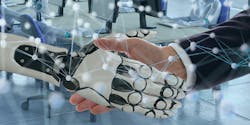Machine Learning Hurdles Are High, But Should Lower Quickly
A new wave of automation is projected to revolutionize the manufacturing industry, with organizations around the world investing in machine learning and artificial intelligence (AI) solutions aimed at improving every phase of production. Manufacturers aim to produce high-quality products at minimum cost, and many see machine learning as a way to streamline production, improve product quality, increase employee safety and more.
While still early in the adoption cycle, machine learning is already playing a role in reducing unplanned machinery downtime, and is expected to make a large impact on predictive maintenance as well. It enables manufacturers to quickly identify anomalies to prevent failures and breakdowns, which is extremely valuable to businesses. In fact, McKinsey predicts that AI-based predictive maintenance will deliver between $500B to $700B in value to manufacturers.
Machine learning and AI are also predicted to have a huge effect on supply chain and enterprise resource planning (ERP). The ability to reduce human error is expected to help alleviate costly recording mistakes that can negatively impact the supply chain and logistics teams that work closely with manufacturers. And when it comes to ERP, one of the largest challenges that machine learning and AI help address is predicting demand. These technologies’ advanced insights help better forecast demand and manage inventory with contextual data.
While the benefits to machine learning in manufacturing are clear, like any new technology, there are still barriers to adoption. This is especially true for a centuries-old industry with slow adoption cycles. Before adopting machine-learning capabilities, manufacturers should consider the following barriers to implementation.
Company Culture
Historically, the manufacturing industry has shied away from opaque logic. Businesses and employees prefer to have a close eye on all processes, diagrams, and data. The machine-learning approach of collecting data and deriving an algorithm from it (instead of the traditional approach of taking an algorithm and deriving data from it) is counter-cultural for manufacturing process engineers.
This obstacle should go away over time; as more machine-learning success stories surface. Most manufacturers now use some form of robotics, and machine-learning and AI technologies will eventually become equally mainstream as use cases break through.
Adopting an increasingly DevOps-focused mindset will also help shift the industry’s mentality. Creating a culture that allows for constant experimentation, transparency and room for failure across departments will enable team members to better identify inefficiencies, shift priorities at an accelerated rate, and streamline innovation.
Lack of Standardization
There are over a thousand protocols for devices across the different segments of the manufacturing industry. Having multiple standards for manufacturing equipment can make it difficult to normalize and connect data. These difficulties increase when considering that in many cases, equipment in manufacturing facilities comes from different suppliers.
More industry coordination along with standardization of machinery and data integration technology will help overcome many of the challenges related to collection and aggregation. Efforts to standardize across the industry, such as the OPC Foundation’s Unified Architecture (OPC-UA), go a long way, but organizations must still attend to data transformation and quality issues even when diligently following these standards. As the industry pivots to a more automated focus, technology such as advanced data management software will become essential in transforming data across different types of devices, avoiding data inconsistencies, and solving interoperability issues.
High Stakes
Depending on the manufacturing domain, machine learning and automation in the industry is still considered high stakes for many. Apprehension remains around machine safety in an actively evolving area that mixes automated machinery and humans. Manufacturing errors are also quite costly, so manual quality control and processes are still valued in many businesses. As a result, organizations are conservative in terms of the processes they automate.
Hesitancy around the high-stakes nature of machine-learning adoption will be addressed with the improvement of machine-learning operations and ability to monitor and control machine-learning processes. Sometimes referred to as MLOps, machine-learning capabilities will become increasingly accessible to more levels of the manufacturing team as transparency and education around the technology improves. There is a move in the industry to make MLOps software more accessible to application developers, and ultimately, an operations team member will be able analyze a machine-learning system and present it to another team member with a manufacturing background in a digestible way.
It’s quite typical for an machine-learning model to drift as the nature of the data changes, causing the model to not perform as well over time. MLOps enables organizations to deploy, and more importantly monitor, how models are working once they are in production and adjust accordingly for optimal performance.
Looking Ahead
Manufacturing is only one of the many industries facing challenges in developing machine-learning and AI capabilities due to a lack of technical resources and awareness. In the months ahead, the industry will begin to see that by democratizing machine-learning across more skill levels, organizations can more quickly realize its full benefits. This includes addressing misconceptions around machine learning’s complexity and increasing the transparency around what tools and skillsets are required to harness its capabilities. In addition, a new generation of tools that make the technology more accessible to developers without deep machine-learning knowledge is emerging. As you move along in your journey, watch out for the cultural, standardization, and MLOps challenges mentioned, and look for easier-to-adopt tools as a way to move faster and enjoy the benefits of machine-learning sooner.
Jeff Fried, director of product management for InterSystems, is a long-standing data management nerd, and particularly passionate about helping people create powerful data-driven applications. He has extensive experience in data management, text analytics, enterprise search, and interoperability. Jeff is a frequent speaker and writer in the industry; holds 15 patents; and has authored more than 50 technical papers and co-authored three technical books.
